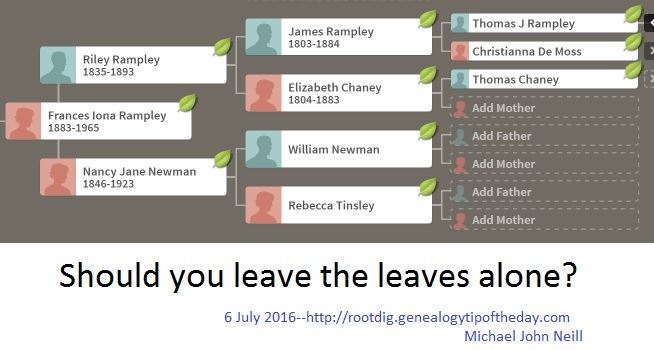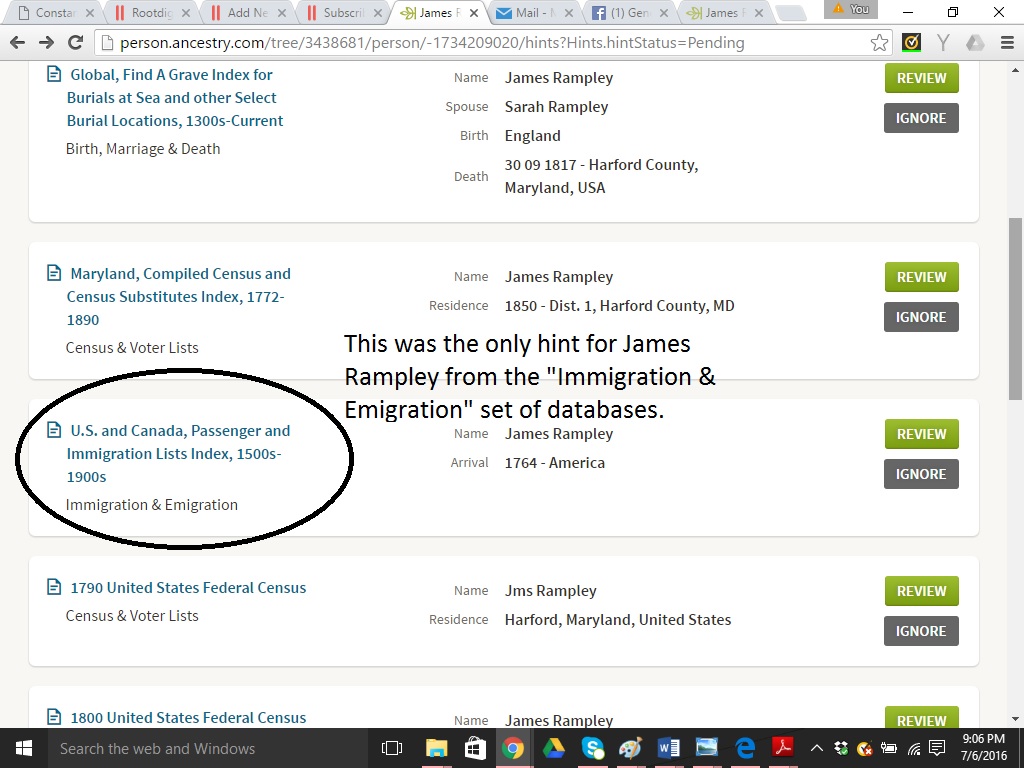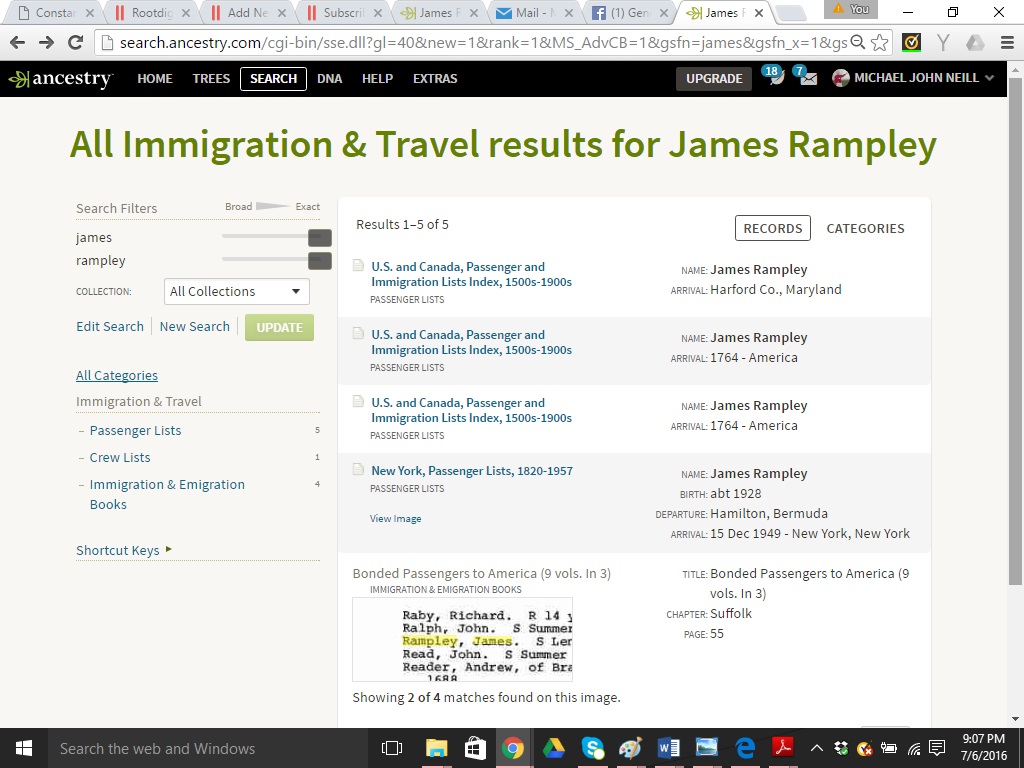 I’m not a fan of the leaves on Ancestry.com. Personally I think the leaves make genealogically sound research more difficult than it already is. Your opinion may differ.
I’m not a fan of the leaves on Ancestry.com. Personally I think the leaves make genealogically sound research more difficult than it already is. Your opinion may differ.
There are two problems I have with the leaves:
- they make problem-solving difficult
- some things located manually aren’t located leafwise
Difficult to effectively problem-solve
Sound genealogy methodology (to me) dictates that we document our search procedure when we query a database, not just list the title and website of what we searched. We need to track:
- how that search was conducted–if a database was queried, then include:
- search parameters
- any wildcards
- proximity operators
- etc.
When people are located, the search procedure is not crucial. After all, we found what we wanted. When they are not located where they are expected to be, then that specific search procedure is needed to analyze the lack of a result and to problem-solve. We don’t track our search procedure because it is fun, but because it’s a part of our research process which should be tracked. (disclosure: I don’t track my search process when I find people–just when I don’t). It is not just sufficient to say “I searched.” Without documenting our search procedure, it is impossible to determine whether our querying of the database was the problem. We can’t know what we overlooked if we don’t know how we looked in the first place.
The “leaves” come to us without us entering in any search terms. Information is pulled from our “online tree” to conduct the search. We don’t know what information is pulled from our database to conduct the search (although we may suspect we do). We don’t know how the search is performed.
That makes problem solving the lack of results difficult.
If I query a specific database for specific search terms myself, then I know how the search was performed. If I fail to locate the person of interest and I’ve tracked my search parameters, I may see other ways that I could have searched, because I know what searches I already conducted. If I share my search parameters with another researcher, they may be able to help me. They may even tell me that the way I searched was totally inadequate and that I totally need to start over.
When I do not track my querying process and fail to locate someone, I can’t problem solve. I can’t analyze. That hinders my research. That is the problem.
It’s like trying fix a car when I have no idea how the motor operates. Knowing where to put in the oil and gas is not sufficient to solve most problems. I need to know more.
It Might Not Even Find Everything
Several readers emailed me privately that the leaves aren’t even finding everything that’s in Ancestry.com. That seems to be the case for one of my ancestors as well.
A “leaf” for my James Rampley (died before November of 1817, probably in Harford County, Maryland) in my online tree did not locate a reference to James in Ancestry.com‘s version of Peter Wilson Coldham’s bonded immigrants to the United States (published on Ancestry.com as Coldham, Peter Wilson. Bonded Passengers to America. Five Volumes in One. Baltimore, MD, USA: Genealogical Publishing Co., 1983.).
The leaf hints only found one potential reference to James in the “Immigration & Emigration” database.  .
.
Yes that database “U.S. and Canada, Passenger and Immigration Lists Index, 1500s-1900s” references Coldham’s book, but it is a separate publication by P. William Filby–so that does not count. The leaf from my tree didn’t pull up Coldham’s book specifically as my search of the “Immigration & Emigration” databases did.
My actual search of the “Immigration & Emigration” databases at Ancestry.com found five references a James Rampley–one might have been too late for the leaf search to locate, but the others should have been returned by the leaf search.
I don’t know why they weren’t. But they should have been. My search for James is anecdotal, but the point is there’s something about the process that’s not catching everything. That’s why anecdotal errors in computer database searches matter, because it indicates there is a problem with the algorithm because it’s supposed to work the same way every time.
It’s not like a surgical procedure that may only work 90% of the time. It’s computer programming, not brain surgery.
Not getting all the results that are there is another problem.
Your mileage may vary. Just remember to check your mileage, never assume your car is operating the way they tell you it is.
Readers can use the leaves or not use them as they wish. But:
Those who know the pitfalls of research tools are better equipped to use those tools and decide whether those tools are ones they want to use.


12 Responses
It was thru ancestry hints that I discovered a Mayflower link which has been documented & proven… I had no idea about this… without those leaves I might have never known…
The leaves have given me hints that have led to me finding the information on sites where I can actually see the documents. I think that they are useful if used properly. However, I do find it frustrating that they don’t show all of the censuses that the people I am looking for are in. I have found them on other sites with the same name, in the same town and with the same family members.
Something is and has been definitely wrong with both the leaves and search parameter algorithms. Most leaves for my ancestors show for someone living another century, another country or state even when I have accepted documentation for that time frame, and proper spelling of the name will show up on way later pages with all the right info, while totally unrelated search results show up at the start of the search results. Using the leaves has been useful, but mostly time consuming and annoying, especially when they won’t show up for the person when searching will show something useful. Lately I’ve collected leaves for people that don’t match anything but the name of an otherwise documented entry. Maddening. I’ve mentioned this problem a number of times in their survey but have seen no changes.
And not being able to change the search parameters on the leaves is very frustrating.
It is somewhat frustrating when the “Hints” do not pick up everything – and they don’t, that has been proven over and over again while I research my family trees. However, I am aware of the shortfall and keep searching. I do tend to check the hints but always see the “resource” for those hints. I much prefer to have the information confirmed and hopefully backed up by some document that I can SEE. It is time consuming, which is why Ancestry does it I’m sure. The longer you are on there searching, the longer they get paid for. Its a business, but its a helpful one as well. There are many many things I would never have found out (yes, they are documented) without Ancestry. So, its rather like one has to give the devil his due. Just make sure you don’t believe everything you read on there. Hate the “indexed only” site, and no I do not trust it.
I will look at the leaves, but find it easier to go to a free Ancestry site to do deep digging without logging in. I have mixed emotions about the leaves.
The way I look at it the “shaky leaf” is just a hint, a clue, a suggestion…nothing more, nothing less. It can provide a direction in which to search bricks (offline) and clicks (online).
Yeah, I’m not crazy about the leaves as they are frequently showing up wrong century, wrong continent, etc. Then
I have to go through the hassle of deleting them to get to others.
The shaky-leaf hints are intended only to suggest low-hanging fruit.
They are not a substitute for a research plan that incorporates known databases and records, whether digitized and accessible on the web or not.
And occasionally they lead you to relatives who have ancestor pictures you have never seen (my story!) Just as you want a thorough research plan, you also don’t want to leave any stone unturned–and leaves can be stones! Clicking to delete obviously wrong hints takes no effort–we ought to be able to do that even as minimal researchers. I say, “Thanks, Ancestry, for pointing me to resources and people I might not have searched for.”
The thing that’s been driving me nuts about the leaves lately is the number of clues I already have…and they know I have them! As I review the clue, it says, “Saved to — family tree.” If I have already saved them, why are you telling me about them, calling them new hints? Grrr!
On the other hand, on occasion, the leaves remind me of something I’ve independently researched on microfilm or another media source that I haven’t gotten around to or have forgotten to link on Ancestry. It’s similar to emails I get from My Heritage reminding me of a digitized print source I haven’t linked consistently online, on laptop or on DNA sites. In the end, those reminders are far less exciting as what periodically I find in new or updwed collections on FS and Ancestry. This week included some huge new immigration records and New England records of use to me.